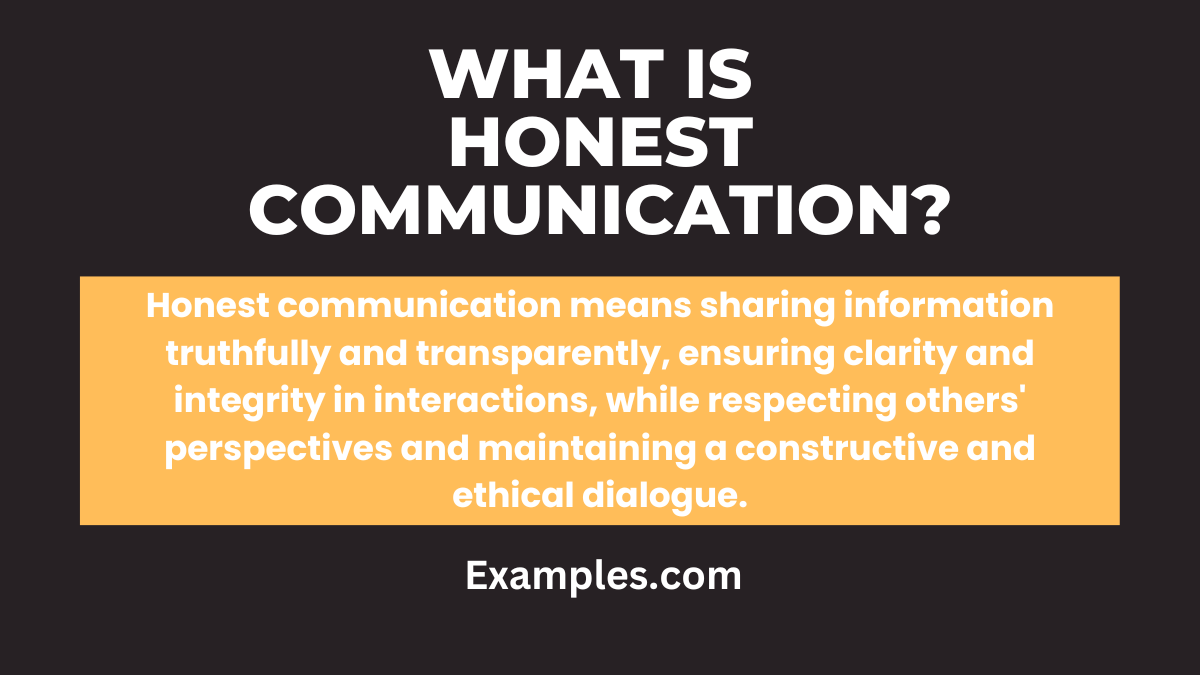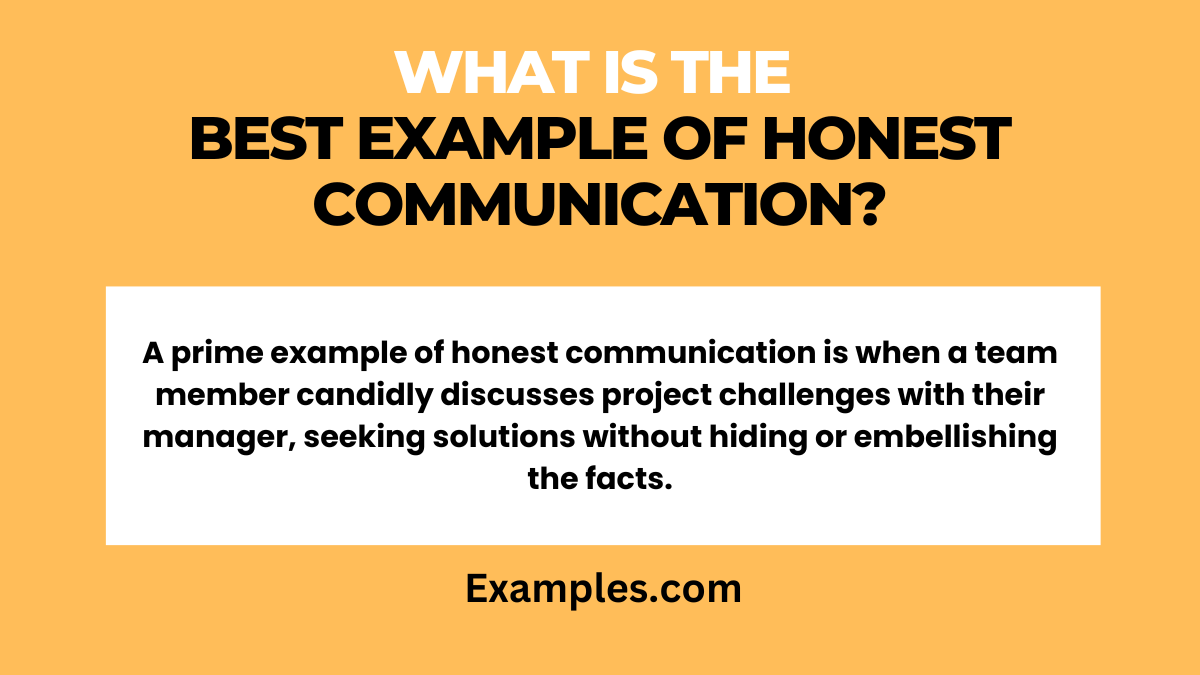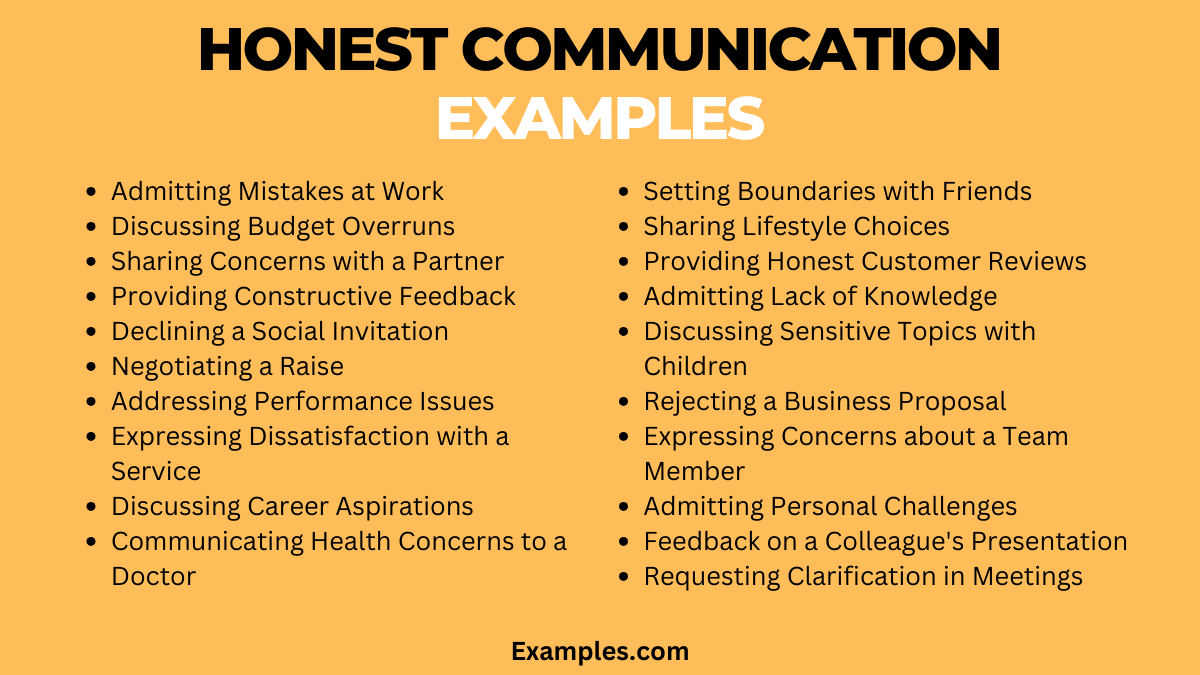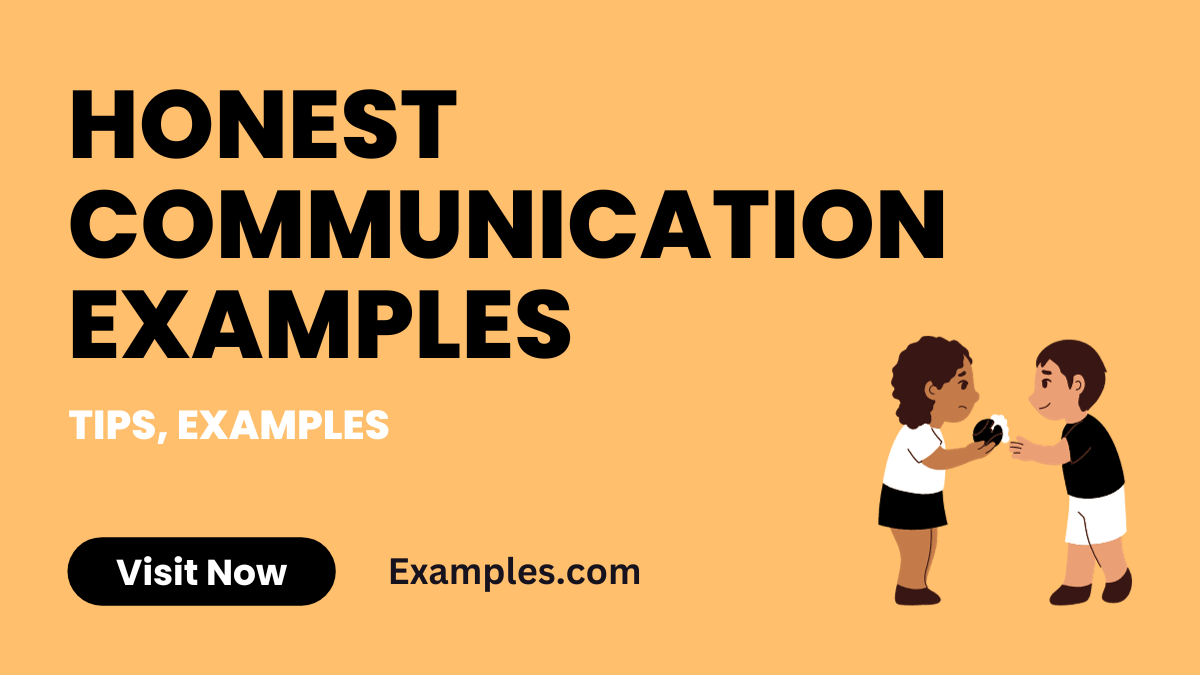Honest Communication
Honest communication is the cornerstone of meaningful and productive interactions, both personally and professionally. This guide delves into the realm of sincere dialogue, enriched with practical communication examples. It underscores how honesty in communication fosters trust, resolves conflicts, and builds stronger relationships. Through various scenarios, we’ll explore the nuances of honest communication, demonstrating its critical role in creating a transparent, respectful, and collaborative environment.
What is Honest Communication? – Meaning

Honest communication is the practice of sharing information truthfully and transparently. It involves speaking sincerely, ensuring messages are conveyed in a clear, straightforward manner. This type of communication, essential for building trust and maintaining integrity, is about being open and genuine in interactions. Honesty in communication ensures that the information shared is authentic and accurate, fostering a reliable and respectful atmosphere in both personal and professional relationships. It’s a key element in establishing and maintaining healthy, effective communication dynamics.
What is the Best Example of Honest Communication?

A prime example of honest communication can be found in constructive feedback sessions within the workplace. In these sessions, managers and employees engage in open, truthful dialogues about performance, progress, and areas for improvement. For instance, a manager discussing a team member’s recent project performance embodies honest communication by providing clear, direct, and respectful feedback.
Such conversations are characterized by a balance of honesty and empathy. The manager might acknowledge the employee’s efforts and strengths while also pointing out aspects that need enhancement. For example, the manager could say, “Your innovative approach to the project brought creative solutions, but I noticed the deadlines weren’t consistently met. Let’s explore ways to manage your time more effectively.”
This scenario highlights open communication in the workplace and open communication with colleagues. It exemplifies how honest communication, when done constructively, not only addresses immediate issues but also aids in personal and professional development, ultimately benefiting the individual and the organization.
50 Honest Communication Examples

Embracing honest communication is pivotal in establishing trust and transparency in various aspects of life. This collection of 50 examples showcases the diverse applications of honest communication, from personal interactions to professional settings. Each example, with a detailed explanation and illustrative sentences, demonstrates how honesty can be effectively woven into communication while maintaining respect and empathy. These scenarios highlight the impact of honest communication in relationships, open communication in the workplace, and effective communication skills in building strong, lasting connections.
Admitting Mistakes at Work
Honesty in admitting errors fosters a culture of accountability and learning.
Example: “I realize now that my approach to the project was flawed, which impacted our timeline.”
Discussing Budget Overruns
Transparently addressing financial issues prevents misunderstandings.
Example: “We’ve exceeded our budget, and I’d like to discuss how we can address this.”
Sharing Concerns with a Partner
Openly expressing concerns strengthens relationships.
Example: “I’ve been feeling overlooked lately. Can we talk about how we’re managing our time together?”
Providing Constructive Feedback
Balancing honesty with empathy enhances growth.
Example: “Your report was well-researched, but I think more focus on the conclusions would enhance it.”
Declining a Social Invitation
Gently expressing unavailability maintains respect.
Example: “Thank you for the invite, but I won’t be able to make it due to prior commitments.”
Negotiating a Raise
Straightforward communication about compensation reflects self-worth.
Example: “Based on my contributions, I believe a salary adjustment is justified.”
Addressing Performance Issues
Honest discussions about performance lead to improvements.
Example: “I’ve noticed some delays in your project delivery. Let’s explore how we can optimize your workflow.”
Expressing Dissatisfaction with a Service
Direct feedback to service providers helps enhance quality.
Example: “The service didn’t meet my expectations. Here’s what I think could be improved.”
Discussing Career Aspirations
Openly talking about career goals with a manager.
Example: “I aspire to take on more leadership roles. How can I work towards this?”
Communicating Health Concerns to a Doctor
Transparently sharing symptoms with a healthcare provider.
Example: “I’ve been experiencing these symptoms frequently, which are affecting my daily activities.”
Setting Boundaries with Friends
Clear communication about personal limits strengthens respect.
Example: “I value our friendship, but I need to set some boundaries regarding my availability.”
Sharing Lifestyle Choices
Being open about personal choices avoids misunderstandings.
Example: “As a vegetarian, I prefer not to attend events at steakhouses.”
Providing Honest Customer Reviews
Constructive reviews help businesses improve.
Example: “The product is good, but it would be better if it had these features.”
Admitting Lack of Knowledge
Acknowledging when you don’t have an answer builds credibility.
Example: “I don’t have the information on that topic right now, but I will find out.”
Discussing Sensitive Topics with Children
Honesty in age-appropriate language aids understanding.
Example: “This topic is complex, but let’s discuss it in a way that makes sense to you.”
Rejecting a Business Proposal
Polite yet straightforward rejection maintains professional relationships.
Example: “Thank you for the proposal, but it doesn’t align with our current strategy.”
Expressing Concerns about a Team Member
Directly addressing issues promotes a healthy work environment.
Example: “I’ve noticed some inconsistencies in your reports. Can we go over them together?”
Admitting Personal Challenges
Sharing personal struggles with a close friend.
Example: “I’ve been going through a tough time lately and could use someone to talk to.”
Feedback on a Colleague’s Presentation
Providing honest, constructive feedback on a presentation.
Example: “Your presentation was informative, but adding more visuals could make it more engaging.”
Requesting Clarification in Meetings
Asking for clarification ensures understanding.
Example: “I’m not clear on the new policy. Can you explain it in more detail?”
Explaining Project Delays to a Client
Openly addressing delays builds client trust and understanding.
Example: “We’ve encountered some challenges that will delay the project. Let’s discuss how we can mitigate this.”
Giving Feedback to a Superior
Constructive criticism to a superior requires honesty and respect.
Example: “I have some thoughts on the new policy that might enhance its effectiveness.”
Handling Customer Complaints
Honesty in customer service can transform complaints into loyalty.
Example: “I understand your frustration and we’re committed to resolving this issue promptly.”
Acknowledging a Miscommunication
Admitting to and correcting miscommunications prevents further issues.
Example: “There was a miscommunication on my part, and here’s the correct information.”
Discussing Personal Goals with a Mentor
Transparent discussions with mentors aid personal growth.
Example: “I’m aiming for a career change and would appreciate your guidance.”
Resolving Workplace Conflicts
Honest discussions are key to resolving interpersonal conflicts at work.
Example: “Let’s address our misunderstanding openly to find a constructive solution.”
Advising a Friend Honestly
True friends offer honest, even if difficult, advice.
Example: “As your friend, I need to tell you my honest opinion about this situation.”
Turning Down a Job Offer
Declining a job offer respectfully and honestly.
Example: “I appreciate the offer, but I’ve decided to pursue a different opportunity.”
Communicating During Performance Reviews
Effective performance reviews require balanced and honest feedback.
Example: “You’ve excelled in these areas, but let’s work on these specific skills.”
Sharing Feedback on Workplace Policies
Honest opinions on policies contribute to better workplace environments.
Example: “This policy could be improved by considering its impact on our daily tasks.”
Expressing Concern Over Workload
Transparent communication about workload prevents burnout.
Example: “I’m concerned about my current workload and its impact on my performance.”
Discussing Salary Expectations in Interviews
Open discussions about salary expectations set clear terms.
Example: “My salary expectations are based on my experience and industry standards.”
Negotiating Contracts with Suppliers
Honest negotiations with suppliers establish long-term relationships.
Example: “Let’s discuss a fair price that reflects the quality and quantity needed.”
Advising on Health Choices
Doctors communicating honestly about health options empower patients.
Example: “These are your treatment options, each with different benefits and risks.”
Communicating Changes in Company Strategy
Transparently discussing strategic changes keeps employees informed.
Example: “The company is shifting its strategy for these reasons, and here’s our plan.”
Requesting Help or Support
Openly asking for help fosters collaboration and support.
Example: “I need assistance with this task to ensure it’s completed on time.”
Discussing Lifestyle Changes with Family
Honest conversations about lifestyle changes maintain family harmony.
Example: “I’ve decided to make these lifestyle changes for my health, and I hope for your support.”
Providing Honest Legal Advice
Lawyers must communicate legal realities honestly to clients.
Example: “Based on the law, here are the likely outcomes of your case.”
Addressing Safety Concerns at Work
Reporting workplace safety issues honestly ensures a safe environment.
Example: “I’ve noticed some safety issues in our workspace that we need to address.”
Expressing Opinions in Group Discussions
Honest opinions in meetings foster diverse perspectives.
Example: “I have a different view on this topic that I’d like to share.”
Declining Invitations Respectfully
Honesty in declining invitations maintains positive relationships.
Example: “I appreciate the invite, but I won’t be able to attend due to other commitments.”
Giving Honest Product Feedback
Customers providing honest feedback help improve products.
Example: “I like the product, but these changes could make it more user-friendly.”
Discussing Career Ambitions with Colleagues
Sharing career goals with colleagues can open opportunities.
Example: “I’m interested in exploring roles in project management in the future.”
Confronting Ethical Issues at Work
Addressing ethical concerns honestly upholds workplace integrity.
Example: “This practice seems unethical, and I believe we need to reconsider it.”
Communicating During Organizational Change
Honesty during transitions eases employee uncertainty.
Example: “The organization is undergoing changes, and here’s what it means for our team.”
Expressing Gratitude Genuinely
Sincere expressions of gratitude strengthen bonds.
Example: “I genuinely appreciate your help on this project. It made a significant difference.”
Sharing Personal Experiences for Learning
Personal stories shared honestly can offer valuable lessons.
Example: “I learned this lesson from my own experience, and I’d like to share it with you.”
Honest Communication in Relationships
In relationships, honest communication is the bedrock of trust and understanding. This guide presents 10 unique examples of how honesty strengthens bonds between partners, family members, and friends. From expressing feelings to discussing future plans, each scenario illustrates the delicate art of conveying truths in a caring and respectful manner. These communication examples delve into various situations, highlighting the transformative power of honesty in deepening connections and resolving conflicts in personal relationships.
- Discussing Future Goals
Openly sharing aspirations ensures aligned paths in relationships.
Example: “I want to discuss our future goals to ensure we’re on the same page.” - Addressing Relationship Concerns
Bringing up concerns respectfully avoids resentment.
Example: “I feel we’ve been drifting apart and would like to understand your perspective.” - Expressing Emotional Needs
Clear communication about emotional needs fosters mutual understanding.
Example: “I need more emotional support during challenging times like these.” - Conveying Disagreements
Honesty in disagreements encourages constructive solutions.
Example: “I disagree with your point, but let’s find a compromise that works for both of us.” - Sharing Financial Worries
Discussing financial issues openly prevents future conflicts.
Example: “I’m concerned about our spending habits and would like to create a budget together.” - Talking about Past Experiences
Sharing past experiences honestly builds deeper trust.
Example: “I want to share some experiences from my past that have shaped who I am today.” - Discussing Parenting Philosophies
Aligning on parenting approaches ensures consistency.
Example: “Let’s talk about our parenting styles to provide a unified approach for our children.” - Addressing Jealousy
Open discussions about feelings of jealousy can strengthen trust.
Example: “I’ve been feeling jealous about your new coworker and needed to share this with you.” - Planning for Major Decisions
Honest conversations about major life decisions are crucial.
Example: “Before we make any decisions about moving, let’s discuss all our options openly.” - Expressing Appreciation and Love
Regularly communicating affection and gratitude nurtures relationships.
Example: “I genuinely appreciate all that you do, and I love you deeply for it.”
Honest Communication in the Workplace
Honest communication in the workplace is vital for fostering a transparent and productive environment. This segment offers 10 unique examples illustrating the effective use of honest communication among colleagues, supervisors, and teams. These examples demonstrate how honesty can enhance team dynamics, boost morale, and contribute to a healthy and open workplace culture, emphasizing the crucial role of communication skills in professional settings.
- Addressing Team Dynamics
Open discussions about team issues promote a healthy work environment.
Example: “Let’s openly discuss our team dynamics to improve how we work together.” - Providing Feedback on Projects
Constructive feedback on projects encourages growth and improvement.
Example: “Your project has great potential, but here are some areas that need refinement.” - Discussing Work-Life Balance
Conversations about work-life balance support employee well-being.
Example: “I’ve been struggling to maintain a work-life balance and would like to discuss possible solutions.” - Negotiating Workload
Transparently negotiating workload prevents burnout.
Example: “I’m currently overwhelmed with tasks and need to renegotiate my workload.” - Conveying Company Changes
Honest communication about company changes reduces uncertainty.
Example: “We are undergoing some organizational changes, and here’s what you need to know.” - Expressing Discontent with Policies
Openly sharing concerns about policies can lead to positive changes.
Example: “I have some reservations about the new policy that I think should be addressed.” - Giving Peer-to-Peer Feedback
Peer feedback, when honest, fosters professional development.
Example: “I value your work ethic, but I think you could improve in time management.” - Discussing Professional Development
Open discussions about career growth benefit both the employee and organization.
Example: “I’m interested in pursuing further training to enhance my skills in our field.” - Handling Conflicts with Coworkers
Directly addressing conflicts with coworkers resolves issues efficiently.
Example: “I believe we have a misunderstanding that we need to talk about.” - Expressing Gratitude to Team Members
Showing genuine appreciation boosts team morale.
Example: “I want to thank you for your exceptional effort on this project. It made a significant difference.”
Each of these examples demonstrates the positive impact of honest communication in both personal and professional spheres, highlighting its essential role in building trust, resolving conflicts, and fostering meaningful connections.
How Do You Ensure Honesty in Your Communication?
Ensuring honesty in your communication is integral for maintaining trust and fostering genuine connections. Start by being self-aware and true to your feelings and beliefs. This aligns with the principles of What is Open Communication? and Honest Communication. Active listening plays a critical role, as it helps in understanding others’ perspectives, a key aspect of Open Communication with Colleagues. Be clear and direct, avoiding ambiguity, to ensure your message is understood as intended. Acknowledging mistakes and being open to feedback demonstrates your commitment to honesty, reflecting the essence of Open Communication in Leadership. Balancing honesty with empathy is crucial; it’s not just about what you say but how you say it, emphasizing the importance of communication style.
Why is Honest Communication Important in a Relationship?
In relationships, honest communication is the cornerstone of a deep and meaningful connection, underscored by the Importance of Open Communication in Relationships. It builds a foundation of trust and transparency, essential elements in any healthy relationship, resonating with the concept of Open Communication in Relationship. Honesty allows partners to express their true feelings, fostering emotional intimacy and understanding. This open dialogue is crucial for resolving conflicts effectively, avoiding misunderstandings, and preventing resentment, a key aspect of Open Communication with Parents and Open Communication with Child. Honest communication supports mutual respect and growth, making it an indispensable part of a thriving relationship.
Tips for Honest Communication
To master honest communication, consider these practical tips:
- Understand Your Intentions: Clear understanding of your motives aligns with Honest Communication in the Workplace, ensuring your message is genuine and purposeful.
- Practice Active Listening: Listening attentively demonstrates respect and helps in understanding the complete message, an aspect of Open Communication with Students.
- Be Clear and Direct: Clarity in communication minimizes misunderstandings, aligning with the principles of Open Communication vs Direct Communication.
- Balance Honesty with Empathy: Being considerate of others’ feelings while conveying your truth reflects a mature communication style.
- Welcome Feedback: Openness to feedback indicates a commitment to honest dialogue, a concept explored in How to Promote Open Communication.
- Acknowledge Mistakes: Admitting errors enhances trust and credibility, vital in Open Communication with Manager.
- Be Consistent: Consistency in your words and actions over time builds trust and integrity, a core element of Open Communication in Leadership.
- Use ‘I’ Statements: Express personal feelings without making assumptions, aligning with Open Communication in Family dynamics.
- Regular Check-Ins: Consistent conversations about thoughts and feelings maintain an honest atmosphere, as seen in Open Communication with Patients.
- Understand Non-Verbal Cues: Recognizing and responding to non-verbal signals enhances the effectiveness of honest communication, a part of Interpersonal communication skills.
Implementing these strategies will not only improve your communication skills but also enrich your personal and professional relationships with honesty and integrity.
Why is Honesty Important in a Conversation?
Honesty in conversation builds trust, fosters transparency, and ensures clear understanding, essential for meaningful and authentic interactions.
How Do You Communicate Honestly?
Communicate honestly by being clear and truthful, understanding your own intentions, actively listening, and respecting others’ perspectives.
Why is It Important to Communicate Openly and Honestly?
Open and honest communication strengthens relationships, encourages trust, and leads to effective problem-solving and decision-making.
What is Honesty in Ethics of Communication?
In the ethics of communication, honesty means sharing information truthfully and transparently, respecting the integrity of the interaction.
Honest communication is a vital component of healthy relationships and effective workplaces. It builds trust, fosters mutual understanding, and creates a transparent environment. By embracing honesty in our interactions, we cultivate deeper connections and establish a foundation of integrity. Ultimately, honest communication is not just about conveying truth; it’s about nurturing respect and authenticity in every conversation.



